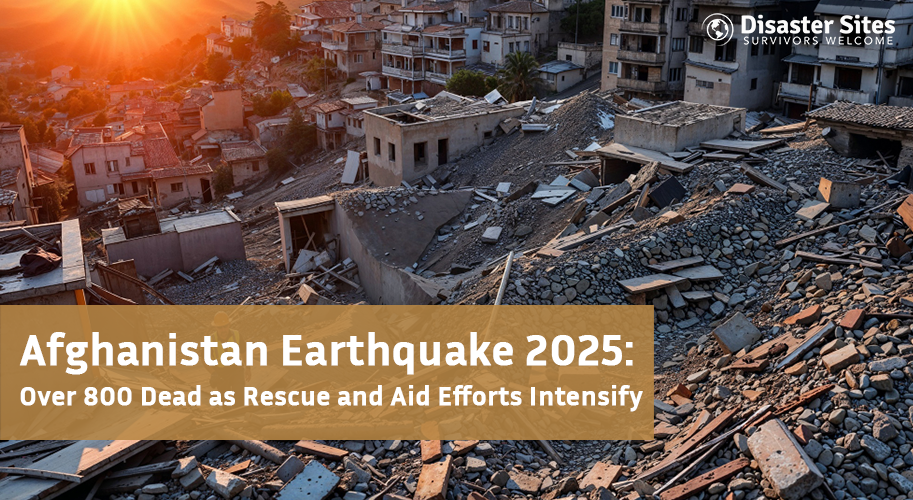We use cookies to personalise site content, social media features and to analyse our traffic. We also share information about your use of this site with our advertising and social media partners.
FEATURED
SPONSORED
VERIFIED

September 2, 2025 -
8 minutes, 10 seconds
-1.1K Views 54 Comments 0 Likes 0 Reviews

A devastating earthquake in Afghanistan has already claimed 800 lives and wounded/thousands of people. It completely leveled villages, trapping families underneath fallen buildings and cutting off access to remote mountain villages. Many areas can only be accessed by air because roads are blocked and the land is too rugged to cross. Helicopter crews are at the forefront of the rescue and recovery, working non-stop to recover victims trapped in the collapsed buildings.
As the scale of the disaster becomes evident and more clear, Afghan Authorities have issued a plea for International aid.The UK and other countries have made pledge to provide assistance but needs on the ground are much larger. The tragedy also demonstrates the precariousness of disaster preparedness in conflict-affected environments and a strong need for a swift and joined global response.
Terror from the earthquake that razed whole villages in Afghanistan happened April 22. Currently, there are over 800 confirmed deaths, and many more are likely since rescuers are just reaching out to areas that were earlier cut off. Thousands of others have injuries, many likely untreated, because of the distance to hospitals.
Devastatingly, houses, schools, and other community buildings are gone, leaving families with nothing to live in. Surviving victims are in dire need of food, fresh water and even medical supplies. The earthquake has had overwhelming implications and consequences on all communities and has also caused overwhelming loss of life and devastated lives and communities in an already fragile environment.
Helicopter crews quickly became a lifeline to isolated communities following the earthquake. Roads are blocked and entire mountain passes are wiped out, air support is the only way to get emergency help to some communities or evacuate injured ones. Crews are working tirelessly to get medical staff, food and supplies into disaster areas while getting survivors out of danger.
Finding survivors through searches comes with many challenges: hazardous flying in rugged terrain, limited availability of machinery, and accessibility for only a small fraction of the devastated areas on any given day. In some villages, survivors have been digging through rubble with their bare hands searching for anyone that may still be alive, for more than a day now.
With these challenges, every hour is valuable. Humanitarian workers on the ground say the time to save lives is running short, and find ways to expedite the deployment of international resources urgently to save lives and stop the death toll from rising.
Events like this highlight that disasters often strike without warning — explore the hidden risks closer to home in our blog on Unexpected Natural Disasters: Hidden Risks in Your Region.
After the earthquake, Afghanistan asked other countries for quick help. Some countries and aid organizations have shown impressive speed in responding, but the extent of destruction calls for much more support. Political issues and lack of established infrastructure continue to delay the delivery of aid.
What survivors of the earthquake face extends beyond the terribly lost lives. Survivors will experience unbearable and deteriorating conditions. Whole families have become homeless and will remain homeless as they are left outdoors in winter conditions in mountainous terrain with a plunge in temperatures at night. They will sleep in the open with only scrapes of their belongings to provide some warmth.
Access to clean drinking water and food is non-existent, only increasing the likelihood of disease outbreaks in overcrowded temporary camps. Medical supplies are in short enough supply to warrant concern. Casualties have overloaded field hospitals. Victims who receive critical injuries will die without timely intervention.
As winter approaches, the crisis is only expected to worsen. Aid agencies have raised warnings that without rapid action, and uptake of aid, vulnerable populations, particularly children, elderly, and pregnant women, will be more exposed to extreme climatic conditions and lead to a medical emergency. Humanitarian disaster has resulted from the earthquake where survival has shifted from an internal outcome to one determined only by the speed and amount of international assistance.
Afghanistan’s earthquake isn’t only a national tragedy, it is also a test for global humanitarianism. Afghanistan’s fragile economy, conflict-torn instability, and poor degrees of infrastructure mean that it will not recover from such a large scale disaster on its own. If Afghanistan cannot benefit from outside assistance, the aftermath will leave scars that last for long after the actual disaster and destabilize the people and the country for years.
This tragedy is also a reminder of how earthquakes and other natural forces continually reshape our planet’s surface — learn more in our blog on How Natural Disasters Shape the Earth's Landscape Over Time.
The Afghanistan earthquake of 2025 will leave behind thousands of heartbreaks with their own impacts on lives cut short due to destruction, and the many that face tenuous days of survival that will follow. Helicopter teams have continued to execute heroic rescue missions amid hydraulic pressure of terrain, resource limitations, and the somewhat helpless need for humanitarian aid which would benefit from a global response.
This tragedy provides a sobering reminder of how susceptible communities are to natural disasters, but especially in places already vulnerable and weakened by the impact of war and internal conflict or economic peril. The absolute nature of timely response by the international community means the greatest difference between the survivors plunging into despair, or looking toward hope.

“To assist disaster survivors by providing a source for them to come together in time of need, to aid in the listing of events, information and other forms of assistance, and continuing support through the recovery process.”
Share this page with your family and friends.